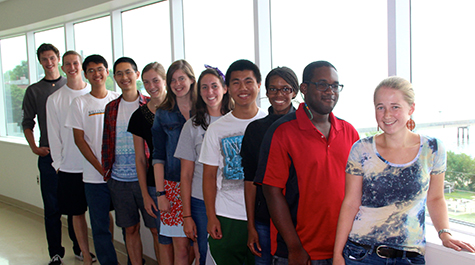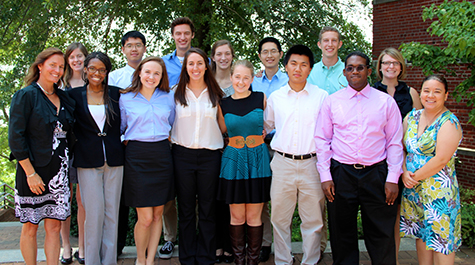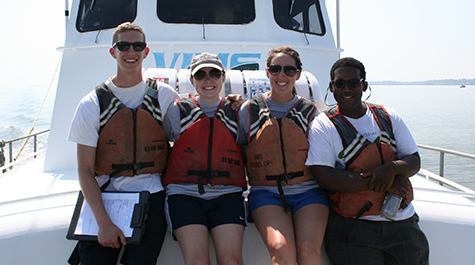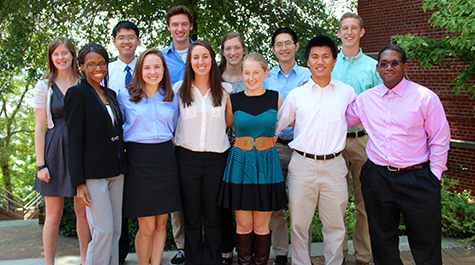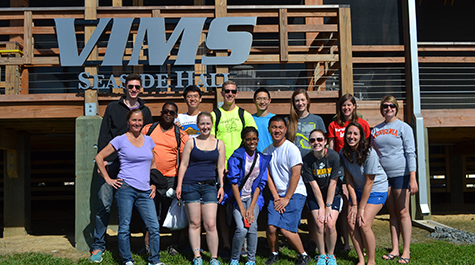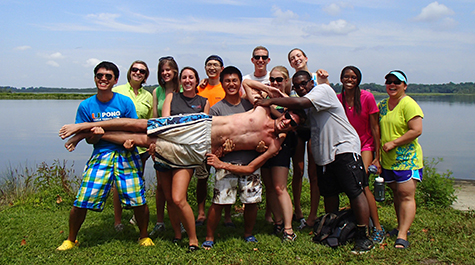VIMS provides research experience for undergraduates
College students from around the nation showcased their summer research projects for an audience of faculty, staff, and students at the Virginia Institute of Marine Science on July 30th.
The students are interns in VIMS’ “Research Experience for Undergraduates” (REU) program, which offers highly individualized research experiences for 12 college students who represent the cream of the crop out of the more than 200 applicants that apply each year. The program is funded by the National Science Foundation, VIMS, the College of William & Mary, private donors, and grants to individual faculty.
The interns in this year’s REU program were Paige Bippus (College of Charleston); Robert Boyd (William & Mary); Julia Carroll (Williams College); Jennifer Fredley (University of Louisville); Richard He (Cornell University); Rebecca Kolkmeyer (University of Virginia); Yishen Li (University of Miami); David Matthews (University of Massachusetts at Amherst); Matthew Schliep (William & Mary); Jingwei Song (Wabash College); Brianna Stanley (Washington State University); and Elizabeth Wallace (University of Virginia).
Directed by VIMS professor Rochelle Seitz, the program allows each student to work closely with one or more faculty mentors—often within the context of a research team—to develop an individual project. The students work with their mentors to develop a prospectus, conduct their research, and present their results in the final program.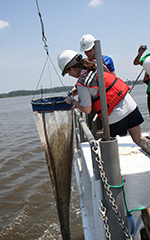
“Our REU program is a meaningful way of offering hands-on research experience in coastal and estuarine science to undergraduate students,” says Seitz. “The students have the unique opportunity to gain exposure to estuarine and freshwater ecosystems by taking several field trips during their time at VIMS, in addition to getting to conduct their own independent research projects.”
The REU Experience
REU intern Robert Boyd, who studied lobster anatomy with VIMS professor Jeff Shields, says he’s thankful the program allowed him to work with faculty who are knowledgeable about marine invertebrates. “I learned an invaluable amount of information this summer,” he says. “My favorite part of the program was being around so many people who support my interest in marine invertebrates. It can be difficult to discuss topics such as blue crab cannibalism with anyone other than a scientist who shares my same interests.”
Boyd says he hopes to build a career working on multimedia projects concerned with biology after graduating from W&M.
Fellow REU intern Jingwei Song hopes to pursue a career as a professor of biology, and says he joined the program to gain an inside look at lab work so he could see what it will be like when he pursues his Ph.D.
“I really enjoyed this program, especially because all of the interns formed a close bond that wouldn’t have been possible otherwise,” says Song. Fellow intern Brianna Stanley echoed Song’s sentiments, noting that her favorite part of the program is the unique relationship and sense of community that builds among the interns.
Stanley worked with VIMS Professor Deborah Bronk, Lab Specialist Marta Sanderson, and Ph.D. student Jenna Spackeen to study how microorganisms in the York River might respond to climate warming and elevated nitrogen levels. “The REU program at VIMS opens the door for interns from all over the country to create new friendships,” she says. “The most important thing I learned is if you enjoy what you do and have wonderful people to share it with, working can be a lot of fun!”
Jennifer Fredley says she applied to the program because, being from a landlocked state, she wanted to get exposure to marine biology before pursuing it in graduate school. “I would like to work in industry, government, or a non-governmental organization as a researcher in marine ecology,” she says. “My favorite part of the program was the sense of purpose it gave me. Even when I was doing tedious and repetitive tasks, I knew it was part of a bigger project and I could see the progress I was making each day.”
Intern David Matthews says he, like Fredley, was largely unfamiliar with Chesapeake Bay, and thought it would be interesting to work in a new system. Matthews collaborated with VIMS Professor Rom Lipcius to investigate the degree to which ribbed mussels affect growth patterns within Spartina salt marshes. Matthews says he enjoyed working in the field and with the other people in his lab, and hopes to pursue a Ph.D. in marine science.
Fellow intern Elizabeth Wallace has also set her sights on a future in marine science. “This summer helped me realize I want to pursue a career in academia—possibly in physical oceanography or river hydrology,” she says. “I would also really like to be involved in international research.”
Wallace says she applied to the REU program because it sounded like a fun and engaging way to learn what it’s like to do marine research. “I’ve always been intrigued by marine science but have had little exposure to it as a civil engineering major,” she says. “This summer allowed me to gain field and lab experience and learn more about attending graduate school in marine science.”
The VIMS REU program—now in its 25th year—is one of the longest-standing and most successful REU programs in the nation, with more than half of its participants going on to study marine science in graduate school.
2014 REU Student Projects
- Paige Bippus: Predation pressure across a salinity gradient in Chesapeake Bay salt marshes. Mentors: Dr. Emmett Duffy, Jon Lefcheck
- Robert Boyd: Atlas of lobster histology and anatomy. Mentor: Dr. Jeffery Shields
- Julia Carroll: Comparison of epifaunal communities on natural oyster shell and alternative substrates in Chesapeake Bay. Mentors: Melissa Karp, Dr. Rochelle Seitz
- Jennifer Fredley: Impacts of oyster density on sedimentary denitrification. Mentors: Dr. B.K. Song, Dr. Ashley Smyth
- Richard He: Determining the mitochondrial DNA differences between selectively bred hatchery lines and wild populations in the Lafayette River, VA. Mentors: Brendan Turley, Dr. Kim Reece
- Rebecca Kolkmeyer: Bivalves and eutrophication. Mentors: Annie Murphy, Dr. Iris Anderson
- Yishen Li: Effects of boring sponge on Eastern oysters: Implications for nitrogen cycling. Mentors: Dr. Ashley Smyth, Dr. Lisa Kellogg
- David Matthews: Do ribbed mussels (Geukensia demissa) facilitate pattern formation in Spartina alterniflora salt marshes? Mentor: Dr. Rom Lipcius
- Matthew Schliep: The role of ribbed mussels (Geukensia demissa) in living shorelines: Settlement and potential for influencing nutrient cycling. Mentors: Dr. Donna Bilkovic, Molly Mitchell, Robert Isdell
- Jingwei Song: Microsatellite analyses of tautog, Tautoga onitis, population structure off the Atlantic coast. Mentors: Dr. Jan McDowell, Dr. Hamish Small
- Brianna Stanley: Heat’N-Up the York River: Responses of microorganisms to temperature elevation and nutrient loading. Mentors: Jenna Spackeen, Marta Sanderson, Dr. Deborah Bronk
- Elizabeth Wallace: Interannual variability of temperature, salinity, and shelf-water volume in the Middle Atlantic Bight from 1977 to 2013. Mentor: Dr. Donglai Gong


